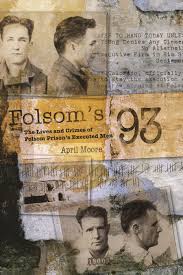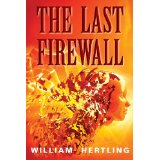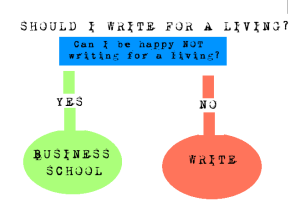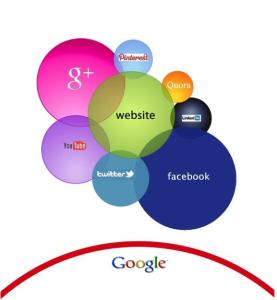 Long-time readers already know my pal April Moore, an astonishingly fun and interesting woman considering her fascination with men executed in Folsom Prison.
Long-time readers already know my pal April Moore, an astonishingly fun and interesting woman considering her fascination with men executed in Folsom Prison.
Her book Folsom’s 93 is available right now at Amazon, nearly two years after being picked up by a publisher and many years after April started the project.
She’s now busily promoting the heck out of it, but had time in her schedule to answer a few questions about the book, her writing and herself.
Heeeeeeeere’s April.
Me: You got your publishing deal a little more than a year before the book came out. Could you tell us a bit about what happened in between?
April: Well, after my heart rate returned to normal after signing the contract, I got organized. I needed to come up with an efficient plan to finish the research and the writing. Fortunately, the layout for Folsom’s 93, lent itself nicely to be easily broken down into parts; 93 different stories meant I could tackle one story at a time and not get overwhelmed. Not that I didn’t get overwhelmed–I did at times, but having a deadline helped immensely and kept me on track. (And actually, from the time I scored the publisher until the book’s release, it was an agonizing 22 months)!
Your book is compelling, even haunting at times. How did you keep the inherent darkness of the project from clouding over your sunny personality?
Luckily for me, there’s a bit of a dark side to my sunniness. Not only am I drawn to history, historical true crime has always intrigued me. Some of the stories certainly creeped me out and there were times I just needed to get away from the research for a day or two. I seemed to constantly have several irons in the fire at once, which included illustration projects, writing a children’s book, and helping organize a writer’s conference, so I had lots to “escape” to. However, it may not have been wise to have so much going on while trying to meet a publisher’s deadline.
How many queries did you send before you got a bite from a publisher?
Initially, I went the agent route, but even though a few agents were interested in the project, I wasn’t able to entice one enough to sign me up. I decided to look into small publishers and sent my proposal to one in New York and one in California. The California one bit and I’m quite sure champagne was involved.
Your blog made a big difference when it came time to attract a publisher. Could you talk a bit about the blogging process? Any secrets for success? How much did you support the blog via social media?
It’s funny; I know a lot of writers who hate to blog. We’re writers! That’s what blogging is all about! When it comes to promoting yourself, and your writing, you really have no excuse, especially because blogging is virtually free. During my research, I came across so much interesting information about Folsom that I knew would not go into the book, so starting a blog made sense, plus I wanted to start building an audience for when the book came out. I also think that because the research process occupied so much of my time, I missed actual writing; blogging helped me stay creative. I would sometimes promote my blog on Facebook, but I typically used Twitter. The key is to not constantly tweet about yourself or your blog posts. Tweet it once, maybe twice, and in the meantime, tweet about other writing stuff and share links to other writers’ blogs; show that you support all writers, not just yourself. The perpetual self-promoter gets old real fast.
What is the one habit you would say is most responsible for you being able to call yourself a published freaking author?
Staying organized. I’ve been known to be a pile-pusher; moving piles of stuff from one room to the other, but I made it priority to keep my writing life, particularly the Folsom project, well organized. That, and dedication. I never gave up on the book because it meant a great deal to me and I believed in it o much, that I was bound and determined to make it the best it could be.
Was there any habit you had to break, or pastime you had to dial back on, to find the time and energy to become a published freaking author?
The habit I should have broken or dialed back on was not saying “no.” When a fun project or opportunity came up, I would always try to squeeze it in, telling myself that I had plenty of time. Yes, I managed to get everything done, but it nearly killed me in the process. I had to learn to manage my time more effectively and prioritize tasks. I did dial back on cocktail hour(s) which kept the brain fog away (what must Hemingway think?!)
You recently did an appearance on Good Day Sacramento, and on public radio. How did you book those gigs, and what advice would you give about them?
I’m lucky enough that my publisher has an amazing publicist who was instrumental in scheduling not only the TV and radio events, but book signings as well. We exchange promotional ideas and strategies, but he seems to make it all happen. Plus, his name is Jaguar. How could anyone say no to someone with that name? My advice when it comes to these types of gigs, is to be yourself and act natural. I know that sounds cliche, but if you know your book inside and out, and are passionate about it, then you’ll have no problem talking about it. Pretend there are no cameras or microphones and talk about your book as if you’re at a party telling someone about it. Viewers and listeners will see you as genuine and will make it a point to remember your book. Above all, be professional and gracious.
You have a fiction project on tap. Have you had time to work on it after getting Folsom published? Could you tell us about it?
I really wanted to get back to fiction for a while, but it took me two previous novel starts before finally starting one that I could work with. I’m aiming at Urban Fantasy, which is something I’ve always liked, but haven’t attempted in years. Although it’s been having an identity crisis–stuck between YA and Adult fiction, but I think I may have found a solution with New Adult, an up and coming genre that seems to be the talk of the town right now. I’m having a lot of fun with it and I really have to thank my critique group for putting up with a lot of Sh*tty First Drafts while I figured out how to ease back into fiction.
What brilliant question didn’t I ask about you or your writing?
Uh, how about . . . how did I become so brilliant? (Or at least, how do I give the illusion of brilliance?)
What’s the answer to that question?
By attending writers conferences, writing workshops, and reading . . . a lot–not just books, but other writers’ blogs. There is a great deal to learn about the craft of writing and so much of it is at our fingertips. I’ve met and learned from so many amazing people in the writing community, that I owe all of my brilliance (or illusion thereof) to their camaraderie and wisdom.
Read more about April at her blog. And buy her book already.






